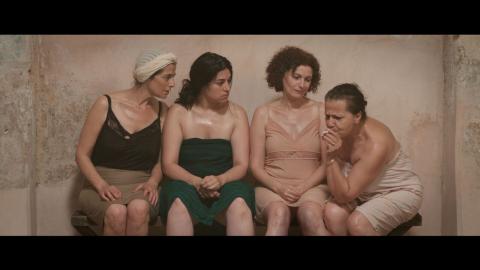Screened as part of Film Africa 2017
Set against the backdrop of the Algerian la sale guerre, ‘I Still Hide to Smoke’ is a heady cocktail mix of people and events that reflects on how the personal and the sexual can come to hold heavy political import, with the added dangerous ingredient of religion too.
As the bombs explode and the struggles between government forces and rebel Islamist groups are playing out on the streets, French-Algerian director Rayhana Obermeyer invites one to enter the private world of women, as they bathe for a day in the traditional hammam in the city of Algiers.
A very disturbing sex scene quickly assaults the senses and creates unusual suspense as to its outcome. But, before long, another helpless female enters the stage, seeking refuge for fear of her life having been caught out as an adulteress. Putting head masseuse and manager of the bathhouse Fatima in a precarious position, she wants to protect the pregnant Meriem but is not sure who to trust with the secret of her hiding.
By 11am, all the other local ladies are clamouring to get inside the building; and, as they are let in, each of them cheerily discards her outer garment or hijab and seems happy to be free in the nude or underwear, ready to start with the beauty and cleansing rituals. Falling into easy female banter as they swap and share shampoos and soaps, they begin to exchange intimate stories about their sex lives and relationships, exploring what it means to be an Algerian woman circa 1995.
The entangled tales reveal a harsh patriarchal societal structure that punishes them both in their homes and in the public space. Pointing at a dark reality, most have experienced some form of abuse; be it at the hands of husbands, male relatives or other misogynists. ‘Princess’ Louisa, for example, was married off at the age of 11 to her father’s friend who sexually violates her; but, in rebellion, she does have an affair with his brother, begetting the latter’s children without the knowledge of the former.
Or in the case of the liberally outspoken Nadia, she suffered an acid attack for being a political activist and reproached for wanting a divorce and taking the pill not to have children. She unwittingly finds herself face to face with Zahia, who is the widow of a self-proclaimed Emir religious fundamentalist and constantly preaching about Allah and the benefits of the veil and jihad.
Not to downplay the other moving #MeToo stories you will encounter, including that of naïve Samia, whose only wish and desire is to experience love and marriage; but, being a 29 year-old masseuse, nobody wants her, even with the promise of ‘a certificate of virginity upon delivery’.
The plot is carried forward with frequent returns by Fatima on the progress of the expectant woman sheltered upstairs whose waters are breaking fast; and, it all ends in spectacular fashion with the intrusion by the men who barge their way into the hamman seeking blood and revenge, led by Meriem’s brother. Whilst the script, that contains plenty of raw humour, provides countless gem quotes that mirror the contradictory arguments wreaking havoc on everyone.
When Zahia admonishes Nadia in one instance for not wearing the veil, she says: “We only fear god and the veil protects us from temptation… The bearded ones protect us from despots”. Nadia then replies with: “You don’t fear god. You want to be god. Behind your veils and beards, all murderers!.. I will fight against your Islamic Republic, even if I have to ally with the devil… Your Islam is not our Islam.”
One is therefore left to contemplate a frightening status of Algerian women in their cultural environment and what seems to be a direct indictment of the men in general. It begs one to consider not just the troubling dynamics between the sexes but also those between the competing interpretations of Islam. There is a danger when the faith is monopolised in the hands of the radicals, as opposed to the more modern, liberal and secular parties and individuals.
Utilising female nudity and hinting at erotic sensibilities, one doubts if this film will make it to the public screens in Algeria or other conservative Arab countries – the bathing scenes had to be shot in Greece. But laying bare the vulnerability of the naked female body in such a cinematic style – and in her choice of casting Arab actresses who all deliver fantastic performances – is perhaps Rayhana’s way of causing an artistic ripple movement towards the liberation of Arab-Muslim women and their right to be heard and protected.
Not for the faint hearted, I highly recommend ‘I Still Hide to Smoke’ to everyone, male and female, Arab or non-Arab. I do also advise, though somewhat hesitantly, that you prepare to light up and enjoy a cigarette after the show!
More information can be found here: http://www.filmafrica.org.uk/i-still-hide-to-smoke/
Note: This article was first published circa November 2017


